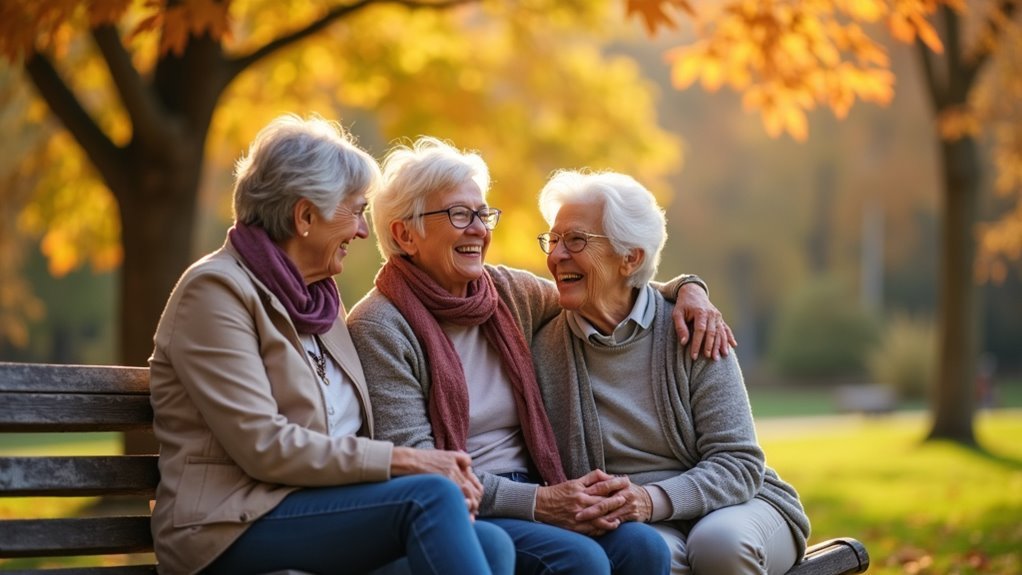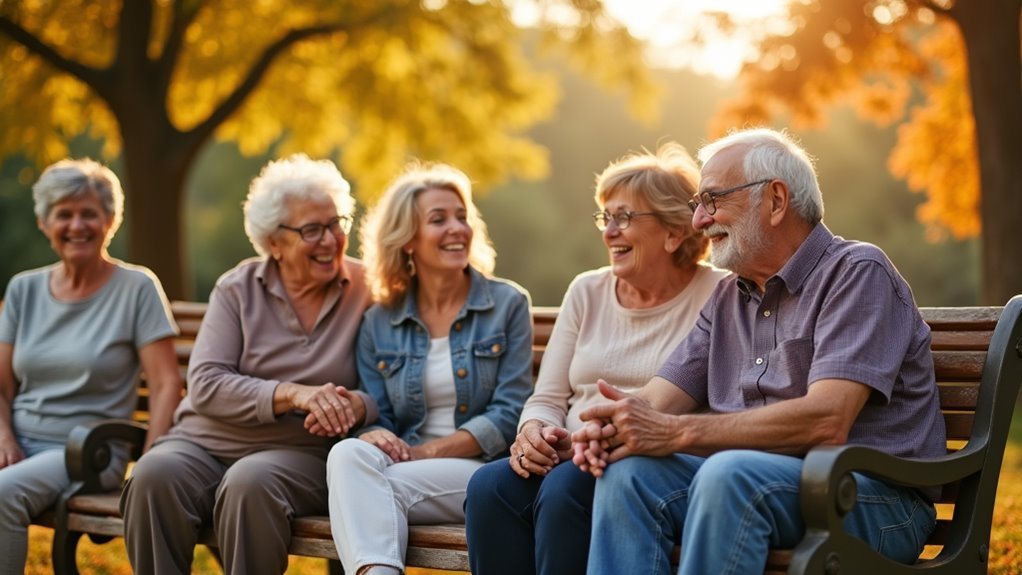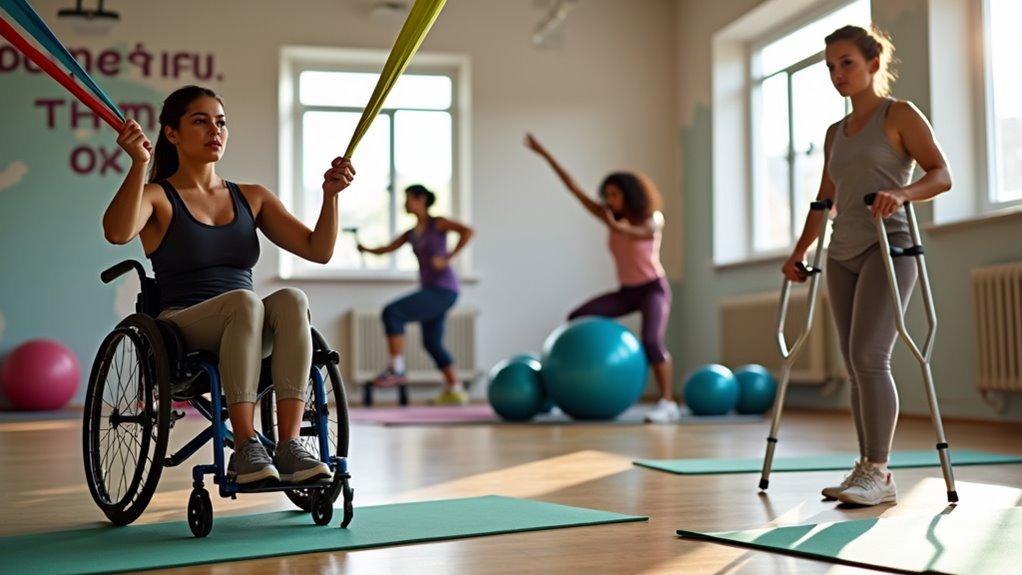Social connections are among your most powerful tools for healthy aging, offering protection that rivals any medical intervention. Strong relationships reduce your risk of dementia, depression, and heart disease while boosting cognitive function and immune response. Meaningful bonds provide mental stimulation through conversation and emotional support that buffers life’s stresses. Social isolation poses health risks equivalent to smoking, making nurturing relationships essential for longevity. Discover how to build and maintain these life-extending connections.
The Critical Role of Social Bonds in Aging Well

While many people focus on diet and exercise as cornerstones of healthy aging, your social connections might be even more powerful predictors of how well you’ll age.
Research shows that maintaining meaningful relationships doesn’t just make you happier—it literally protects your brain and body from decline.
Strong social bonds act as a protective shield, defending your brain and body against the natural wear of aging.
When you nurture strong social bonds, you’re enhancing your cognitive abilities and greatly reducing your risk of dementia.
Your body responds too: you’ll recover faster from injuries and naturally maintain better eating and sleeping habits.
Social isolation, on the other hand, poses health risks equivalent to obesity and smoking.
The key isn’t just having people around—it’s about cultivating genuine, meaningful interactions that provide emotional support and mental stimulation throughout your later years.
How Relationships Exercise Your Brain Better Than Puzzles
Why spend hours on crossword puzzles when a simple conversation with a friend could give your brain a superior workout? Social connections activate multiple brain regions simultaneously, creating a more thorough mental exercise than any solitary puzzle.
When you engage in meaningful conversations, you’re processing language, reading facial expressions, interpreting emotions, and formulating responses—all while maintaining context and building rapport. These complex interactions strengthen cognitive flexibility and problem-solving skills more effectively than traditional brain games.
Your social connections also reduce stress hormones that can impair brain function, while simultaneously boosting memory retention. Research shows that maintaining relationships creates mental resilience and helps prevent cognitive decline as you age.
Think of every conversation as a full-body workout for your brain.
The Hidden Health Risks of Loneliness and Isolation

Although conversations can strengthen your brain, the absence of social connections creates devastating health consequences that many people don’t recognize until it’s too late. Loneliness and social isolation don’t just affect your mood—they’re silent killers that rival obesity and smoking in their impact on your health.
| Health Impact | Risk Level |
|---|---|
| Depression & Anxiety | Considerably Higher |
| Heart Disease & Stroke | Increased Rates |
| Dementia & Alzheimer’s | Greater Likelihood |
| Premature Death | Equivalent to Smoking |
When you’re isolated, your risk of developing chronic conditions skyrockets. Research shows that loneliness triggers the same biological stress responses as physical threats, leading to inflammation and compromised immunity.
Mental health issues compound these problems, creating a dangerous cycle. Vulnerable populations—including first-generation immigrants and LGBT older adults—face even greater risks from prolonged isolation.
Why Some Groups Face Higher Vulnerability to Social Isolation
You’ll find that certain groups face considerably higher risks of social isolation due to barriers that aren’t always visible to the broader community.
Cultural and language differences can create walls between you and potential connections, while discrimination and stigma effects push some individuals further to society’s margins.
When you’re part of a community with limited support networks, these challenges compound, making meaningful social engagement feel nearly impossible to achieve.
Cultural and Language Barriers
When you’re steering through life as a first-generation immigrant or member of a marginalized community, the path to meaningful social connections becomes markedly more challenging.
Language differences create communication barriers that prevent you from participating in social activities and building relationships within your community. Cultural misunderstandings often lead to discomfort in social settings, making you feel even more marginalized.
The LGBT community faces additional hurdles, experiencing higher rates of loneliness due to societal stigma and discrimination. These barriers profoundly impact your mental and physical health, leaving you socially isolated when you need support most.
- Language barriers limit participation in community activities and relationship-building
- Cultural differences cause misunderstandings and social discomfort
- LGBT individuals face discrimination that increases loneliness
- Intergenerational programs help bridge cultural divides
Discrimination and Stigma Effects
Discrimination creates a vicious cycle that pushes vulnerable groups deeper into social isolation, making it nearly impossible to break free from loneliness.
When you’re part of a marginalized community like first-generation immigrants or the LGBT community, you’ll face barriers that limit your access to social support networks.
Discrimination doesn’t just hurt in the moment—it breeds feelings of unworthiness that make you withdraw from potential connections.
You’ll find it harder to access community resources and support systems, which blocks your path to meaningful relationships.
This social isolation directly contributes to mental health issues including depression and anxiety.
These conditions then make it even more difficult for you to engage socially, trapping you in an endless cycle of loneliness and deteriorating well-being.
Limited Community Support Networks
Although discrimination creates barriers to connection, the actual infrastructure of support often remains inadequate or inaccessible for the groups that need it most.
When you’re a first-generation immigrant, language barriers can prevent you from accessing existing community support programs. If you’re LGBT and facing family rejection, you’ll struggle to find welcoming spaces. Financial constraints limit your ability to participate in activities that could strengthen social connections, while chronic health conditions make it physically challenging to engage with your community.
Key barriers to community support include:
- Language and cultural obstacles blocking access to services
- Geographic isolation from relevant support networks
- Physical limitations preventing participation in activities
- Economic barriers restricting engagement opportunities
These structural gaps leave vulnerable populations without essential social connections.
Building New Connections When Old Friends Are Gone
The loss of longtime friends through death, illness, or relocation creates an emotional void that many older adults struggle to fill.
When cherished friendships end through loss or distance, the resulting emptiness can feel impossible to overcome for aging adults.
However, building new social connections remains vital for healthy aging, especially since one in four adults over 65 experiences social isolation.
You can counteract loneliness by actively seeking new acquaintances through clubs, volunteering, or community activities.
These shared interests foster belonging and purpose while providing cognitive benefits that enhance mental agility.
Life changes like retirement or spousal loss increase isolation risks, making it important to explore support groups and social opportunities.
Don’t let mobility issues stop you—seek transportation options or participate in accessible community programs.
Overcoming Hearing Loss and Other Barriers to Social Interaction

While seeking new social connections proves beneficial, physical barriers often prevent older adults from fully engaging with others. Hearing loss stands as one of the most significant obstacles, making conversations difficult and causing many to withdraw from social situations.
However, addressing these challenges early can reveal tremendous health benefits and preserve your cognitive function.
Here are effective strategies to overcome these barriers:
- Get hearing aids – Modern devices dramatically improve communication and social engagement
- Address hearing issues promptly – Early intervention prevents cognitive decline and isolation
- Participate in community activities – Regular outings combat loneliness and create opportunities for meaningful interactions
- Join programs designed for older adults – These provide structured environments for forming new relationships
Taking action against these barriers guarantees you’ll maintain crucial social connections throughout your aging journey.
Preparing Your Social Network Before Major Life Transitions
You’ll want to start building your social network well before retirement, divorce, or other major changes hit your life.
Don’t let work friendships fade when you leave your job—make concrete plans to stay connected with colleagues who matter to you.
Consider joining support groups or community organizations now, so you’ll have established connections when life shifts inevitably occur.
Build Networks Early
Because major life changes like retirement or losing a spouse can dramatically increase your risk of social isolation, you’ll want to start building your social network well before these modifications occur.
Research shows that 1 in 4 older adults experience isolation during major shifts, making proactive relationship building essential.
Think of strengthening social connections like preparing for a workout—you’re building emotional and cognitive resilience for future challenges.
When you establish meaningful relationships beforehand, you’ll have vital support systems ready when you need them most.
- Join clubs or community organizations that align with your interests
- Attend neighborhood events and local gatherings regularly
- Volunteer for causes you care about to meet like-minded people
- Participate in support groups or discussion circles before crises arise
Maintain Work Friendships
Although retirement might seem distant, the relationships you’re building at work today will become lifelines during major changes. Your colleagues who share coffee breaks and project deadlines can provide essential emotional support when you shift out of the workforce.
Research shows that people who maintain these social connections after retirement experience higher happiness levels and better health outcomes, including reduced depression and improved cognitive functioning.
Don’t wait until your last day to nurture these friendships. Start planning regular meet-ups, join group activities, and schedule informal gatherings outside the office.
These proactive steps create a robust support system that’ll ease your adjustment to retirement and help you maintain the sense of belonging that work naturally provides.
Join Support Groups
Before life’s inevitable changes arrive, support groups offer a strategic way to build connections with people who understand similar challenges.
Whether you’re approaching retirement or facing potential loss, these groups create robust social connections that’ll cushion major shifts. You’ll find yourself surrounded by others traversing similar experiences, reducing isolation and building emotional resilience.
Support groups strengthen your coping mechanisms through shared discussions about grief and stress. Research shows participants report higher happiness levels and improved cognitive function.
Beyond emotional benefits, you’ll gain practical advice and resources from group members who’ve walked similar paths.
- Build resilience through shared experiences and mutual understanding
- Reduce depression risk with enhanced emotional support systems
- Gain practical wisdom from others who’ve traversed similar shifts
- Strengthen social connections before you actually need them most
The Science Behind How Social Ties Improve Physical Health
When you maintain strong social connections, your body responds with measurable improvements that extend far beyond emotional well-being. Research reveals that social relationships dramatically impact your physical health through multiple biological pathways.
| Health Benefit | Impact | Research Finding |
|---|---|---|
| Longevity | 50% increased survival rate | Strong social ties vs. isolation |
| Cardiovascular Health | Lower blood pressure | Reduced stress from social interaction |
| Immune Function | Stronger disease resistance | Active relationships boost immunity |
| Inflammation Levels | Decreased chronic inflammation | Social isolation increases inflammatory markers |
Your socially engaged lifestyle triggers healthier behaviors like improved diet and exercise habits. When you’re connected to others, your stress hormones decrease, protecting your heart and reducing stroke risk. Conversely, loneliness creates inflammatory responses that contribute to autoimmune diseases and metabolic disorders, making social connections essential for ideal aging.
Practical Ways to Connect When You’re Feeling Isolated
When isolation creeps in, you don’t need to start from scratch to rebuild your social world.
Reach out to old friends, former colleagues, or family members you’ve lost touch with—a simple text or phone call can reignite meaningful connections.
You can also expand your circle by joining local clubs, community organizations, or volunteer groups where shared interests create natural bonds with new people.
Reconnect With Existing Networks
Although isolation can feel overwhelming, you already possess valuable connections that simply need rekindling. Your existing network of friends, family, and acquaintances represents a foundation of established social bonds that can be revitalized with intentional effort.
Start by reaching out through simple phone calls, texts, or emails to people you haven’t contacted recently. These small gestures often lead to meaningful conversations and renewed relationships.
- Schedule regular visits or outings with family members and close friends
- Engage in shared hobbies or activities with existing connections to strengthen bonds
- Attend family gatherings and community events to maintain social ties
- Use video calls and social media to bridge distances with loved ones
Reconnecting doesn’t require you to make new friends—it’s about nurturing what you already have.
Join Community Groups
While reconnecting with existing relationships provides a strong foundation, exploring new social circles through community groups opens doors to fresh connections and shared experiences. Local clubs and organizations create opportunities to engage with peers who share your interests, whether that’s gardening, reading, or volunteering.
| Activity Type | Benefits | Transportation | Cognitive Impact |
|---|---|---|---|
| Book Clubs | Social learning | Often provided | Enhanced reading comprehension |
| Gardening Groups | Physical activity | Group carpools | Problem-solving skills |
| Volunteer Work | Sense of purpose | Coordinated rides | Leadership development |
| Hobby Classes | Skill building | Accessible venues | Creative thinking |
Research shows that older adults participating in community service report improved health perceptions and reduced loneliness. These social connections foster belonging while stimulating mental engagement through meaningful activities.
How Healthcare Providers Can Help Combat Social Isolation
Healthcare providers serve as frontline defenders against social isolation by incorporating loneliness screenings into routine patient visits. Your doctor can identify early warning signs and connect you with community resources that foster meaningful relationships.
They’ll discuss the importance of social connections for your overall health and well-being, encouraging you to maintain existing bonds while building new ones.
- Community referrals – Your provider can connect you with local clubs, volunteer opportunities, and social organizations
- Health barrier treatment – Addressing hearing loss, depression, and mobility issues that prevent social participation
- Collaborative programs – Working with community organizations to create engaging activities for older adults
- Relationship counseling – Providing guidance on maintaining and strengthening existing social connections
Technology and Community Resources for Staying Connected
Technology bridges the gap between physical distance and meaningful relationships, offering you powerful tools to stay connected with family, friends, and your broader community.
Video calls and social media platforms help you maintain connections, especially if you live in rural areas or face mobility challenges. Local senior centers and clubs provide structured activities where you’ll meet new people and build friendships.
Intergenerational programs use technology to connect you with younger generations, reducing isolation while creating mutual support. Online volunteering opportunities let you contribute to your community from home while forming meaningful connections.
Research shows that when you use technology to enhance social interactions, you’ll experience greater happiness and less loneliness.
Frequently Asked Questions
Why Is Social Connection Important for Older People?
You’ll reduce your risk of depression, anxiety, and premature death through strong social connections. They’re as essential as avoiding obesity or smoking, while enhancing your cognitive abilities and helping you recover faster from injuries.
How Does Social Interaction Affect Aging?
Social interaction acts as mental exercise, boosting your cognitive flexibility and physical recovery. You’ll develop healthier habits, reduce chronic disease risks, and maintain sharper thinking skills that help you age more successfully.
Why Is Social Participation Important for Older People?
You’ll experience enhanced cognitive flexibility and reduced dementia risk through social participation. It combats isolation, boosts your sense of purpose, improves mental health, and encourages healthier lifestyle choices that promote overall well-being.
Why Is Social Connection Support Important for Our Health and Well-Being?
You’ll experience better cognitive abilities and faster injury recovery when you maintain strong social bonds. Social connections reduce your risk of heart disease, depression, and premature death while enhancing your mental flexibility.
In Summary
You’re not meant to age alone. Your social connections aren’t just nice-to-haves—they’re essential medicine for your mind and body. Whether you’re building new friendships, reconnecting with old ones, or using technology to bridge distances, every relationship you nurture adds years to your life and life to your years. Don’t wait for loneliness to take hold. Reach out today, because your health depends on it.





Leave a Reply